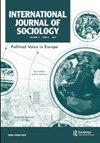Subjective Wellbeing in Rural and Urban Central Europe: Evidence from the European Social Survey (2008 and 2018)
IF 1.1
Q2 SOCIOLOGY
引用次数: 1
Abstract
Abstract Social surveys on wellbeing have been increasingly including measures of subjective wellbeing, alongside more often used objective ones, as they show the importance of a more comprehensive approach to understanding what constitutes good and happy lives. This paper relies on the European Social Survey (ESS) data from Round 4 (2008) and Round 9 (2018) to analyze and compare subjective wellbeing (SWB) in rural and urban areas of eight Central European countries: Austria, Croatia, the Czech Republic, Germany, Hungary, Poland, Slovenia, and Slovakia. Based on available ESS items, we have constructed a more concise version of the VanderWeele et al.’s Flourishing Index, which we termed the Subjective Wellbeing Index (SWI), and which includes the following domains: (1) happiness and life satisfaction, (2) mental and physical health, and (3) financial and material stability. The main results indicate that all eight CE countries have relatively high and improving SWI scores, but stable relational position over the ten-year period. When looking at the rural-urban subsamples, all countries scored higher on the SWI in urban areas in 2008, with significant improvements in the rural areas of more affluent EU countries by 2018 as Austrian, Czech and German rural areas exhibited higher SWI scores than their urban counterparts.中欧城乡主观幸福感:来自欧洲社会调查(2008年和2018年)的证据
关于幸福的社会调查越来越多地包括主观幸福的衡量标准,以及更常用的客观衡量标准,因为它们显示了一种更全面的方法来理解什么是美好和幸福的生活的重要性。本文依靠欧洲社会调查(ESS)第4轮(2008年)和第9轮(2018年)的数据,分析和比较了八个中欧国家(奥地利、克罗地亚、捷克共和国、德国、匈牙利、波兰、斯洛文尼亚和斯洛伐克)农村和城市地区的主观幸福感(SWB)。基于现有的ESS项目,我们构建了一个更简洁的VanderWeele等人的繁荣指数,我们称之为主观幸福指数(SWI),它包括以下领域:(1)幸福和生活满意度,(2)心理和身体健康,(3)经济和物质稳定。主要结果表明,8个CE国家的SWI得分都相对较高且在不断提高,但在10年期间保持稳定的关系地位。当观察城乡亚样本时,2008年所有国家的城市地区的SWI得分都较高,到2018年,较富裕的欧盟国家的农村地区的SWI得分显著提高,因为奥地利、捷克和德国的农村地区表现出高于城市地区的SWI得分。
本文章由计算机程序翻译,如有差异,请以英文原文为准。
求助全文
约1分钟内获得全文
求助全文

 求助内容:
求助内容: 应助结果提醒方式:
应助结果提醒方式:


